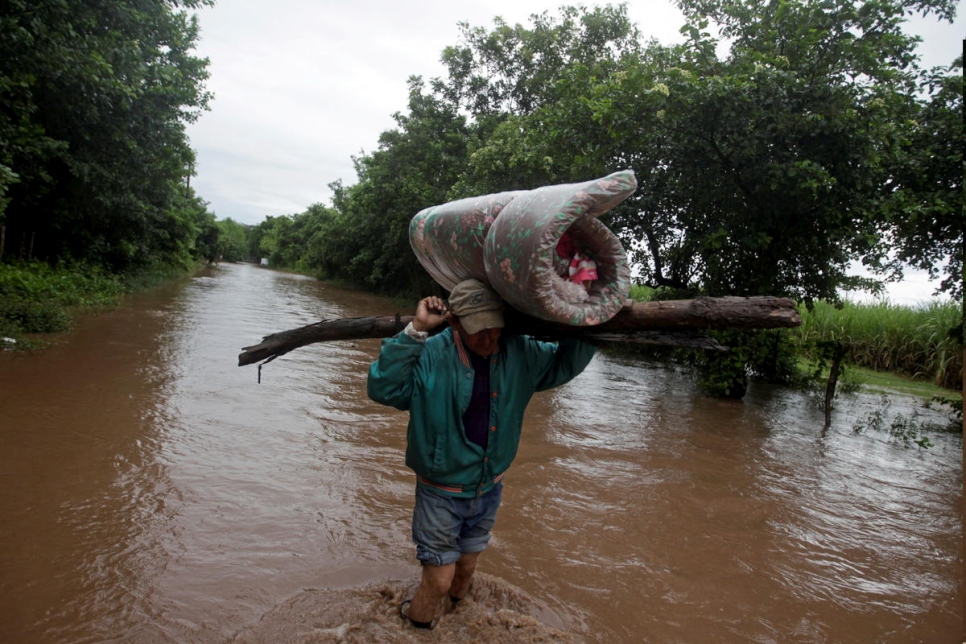Twin scourges COVID-19 and climate change threaten world's displaced and stateless

A man carries his belongings through a flooded road after the passing of Storm Iota, in Marcovia, Honduras November 18, 2020. © REUTERS/Jorge Cabrera
To fight climate change, the world must learn from the COVID-19 pandemic and act with urgency – or risk far-reaching and lethal consequences for people who are forced from their homes, UNHCR’s Assistant High Commissioner for Protection, Gillian Triggs, said today.
“The highest cost will be the cost of doing nothing,” Triggs said at a virtual session of UNHCR’s annual High Commissioner’s Dialogue on Protection. “We need to act together. Unilaterally, we simply can’t respond effectively.”
In a discussion moderated by Al Jazeera India correspondent Elizabeth Puranam, Triggs was joined by displaced, NGO, academic and government speakers to debate the effects of climate change on the world’s most vulnerable people, including those who have been forced to flee their home or are stateless. Drawing similarities with the COVID-19 pandemic, participants said the world must protect the vulnerable but also involve them in finding solutions.
“If we want to solve the problem of climate change, we have to put the most vulnerable in the centre,” said Hindou Oumarou Ibrahim, an activist from Chad who advocates for environmental justice and Indigenous Peoples’ rights. Chad and other countries in Africa’s Sahel face one of the fastest growing displacement crises and are disproportionately exposed to the adverse effects of climate change and disasters, such as changing rain patterns contributing to floods and droughts.
The world’s vulnerable endure some of the worst effects of climate change. Rising temperatures can increase food, water, and land insecurity, while disrupting services necessary for human health, livelihood, settlement, and survival. Invariably, among the most affected are older people, women, children, people with disabilities, and indigenous peoples.
The last decade was the hottest on record. In 2019, nearly 2,000 disasters, most of them weather hazards, triggered 25 million new displacements.
Climate change has continued to accelerate while the world fights the COVID-19 pandemic.
“There is no vaccine, there is no mask. We cannot close the border to climate change – this is not the solution,” Ibrahim said. “So we must act … and take all the solutions from science to traditional knowledge to save our people and our planet.”
The UN High Commissioner for Refugees appointed a Special Advisor on Climate Action for strategic guidance and shaping UNHCR's response to enhance the resilience of displaced people to climate risks and strengthen preparedness and resilience in disaster situations.
Established in 2007, the High Commissioner’s Dialogue enables the exchange of views between refugees, governments, civil society, the private sector, academics and international organizations on emerging challenges in humanitarian protection. This year’s five virtual sessions focus on the impact COVID-19 on displaced and stateless people.
For more information on this topic, please contact:
- In Geneva, Boris Cheshirkov, [email protected], +41 79 433 7682
- In New York, Kathryn Mahoney, [email protected], +1 347 443 7646
For more information on the event and for speaker’s biographies:
https://www.unhcr.org/covid-19-and-climate-change-what-can-we-learn.html
